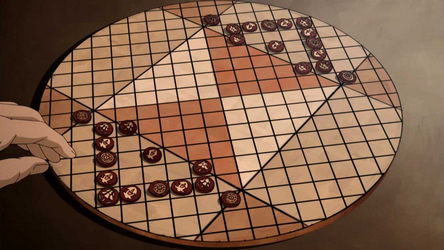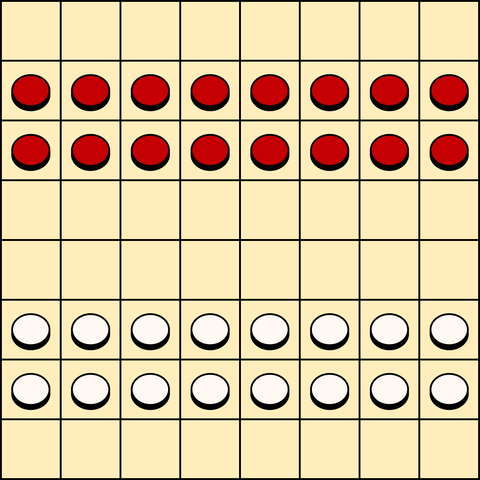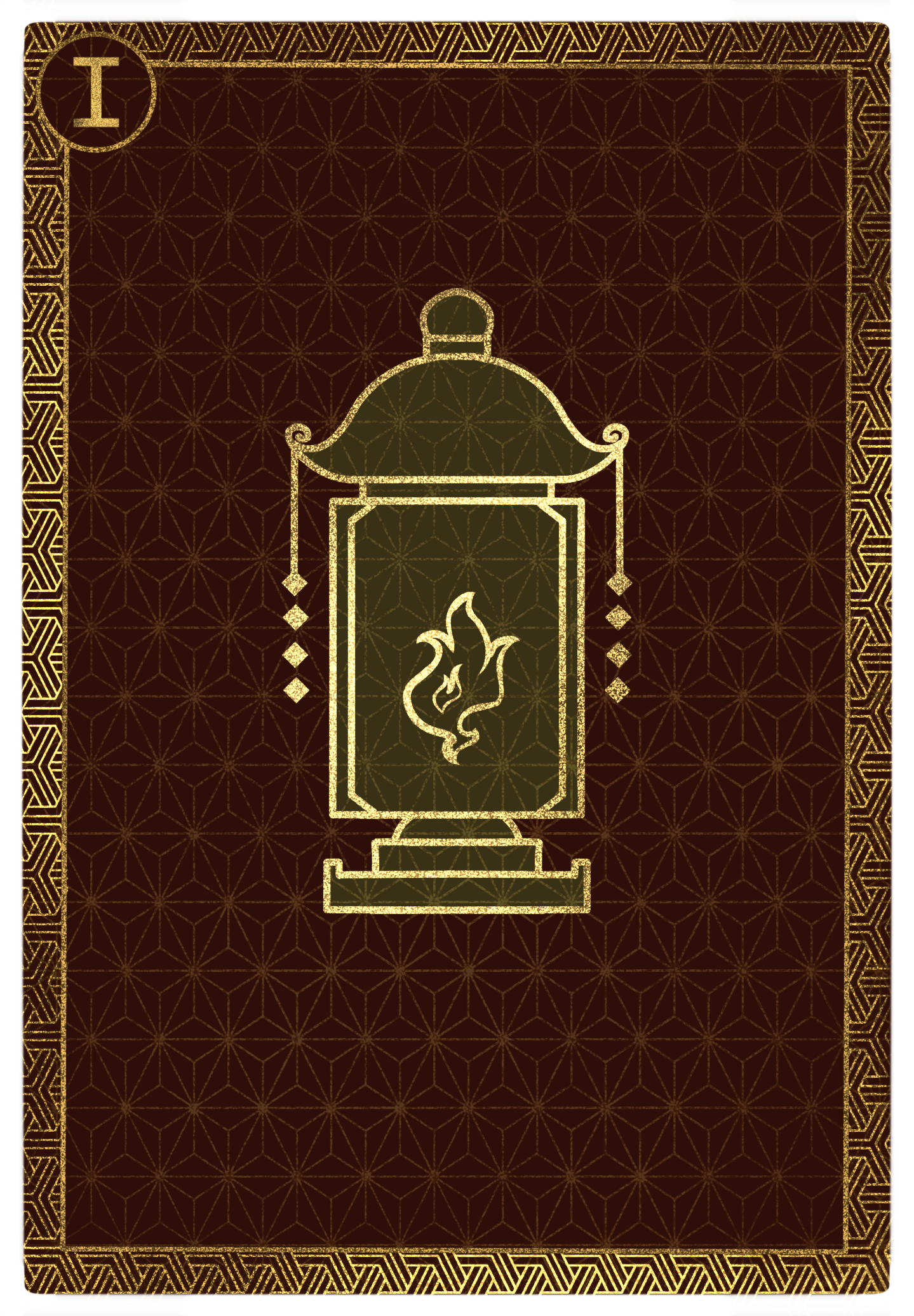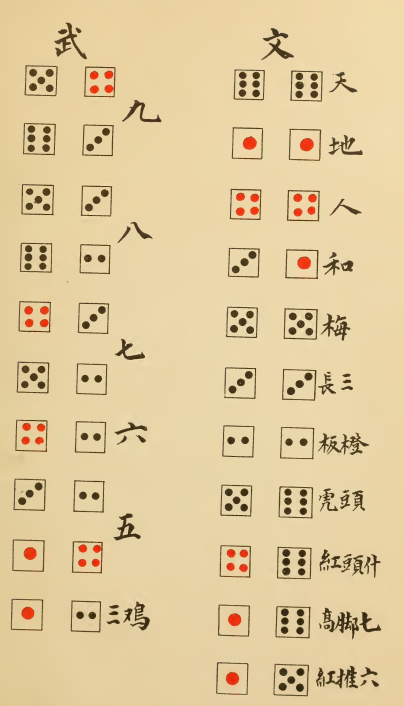Games
The Dynasty plays many games to pass the time, from allegorical board games to gambling games and so forth. Games often transcend social boundaries by using simple, consistent rules; status in games is usually conveyed not by different games, but by fancier boards, more luxurious cards, and so forth.
Game Culture
House Cathak is famous for its intense competitive instinct which often comes to the forefront in sports and games. A stereotype of House Cathak is a hot-headed red-haired legionary flipping a table in frustration for having lost at a game of cards.
House Sesus is infamous for their love of gambling, and, along with House Cynis, are the House which runs most of the Realm’s gambling dens. House Sesus gamblers are as common as House Sesus enforcers; many of the licensed, reputable gambling dens have former Sesus legionaries as bodyguards and security. A common trope in fiction is a House Sesus villain being brought low by a throw of the dice.
House Tepet does not share the rest of the Dynasty’s fascination with cards and dice, preferring tiles and dominos in the Shogunate style. House Tepet shares much more in common when it comes to board games, which they use as a moral and practical instruction tool.
House Cynis rivals House Sesus for investment into gambling establishments, focusing on higher-end casinos and resorts rather than Sesus’ somewhat gritty dens. House Cynis claims that their founder, Cynis herself, was responsible for the phenomenon of coloring the 4 side of dice red like the 1; she once, the story goes, gambled the life of her house on a game to see who could roll the most fours when rolling five dice, and when she rolled five 4s, she ordered thereafter that all fours be marked in bright colors to celebrate her victory.
Board Games
Board games use a set board and a collection of pieces in order to play a specific game. Board games are usually luxurious items crafted of fine materials in order to show off the Dynasty’s wealth. Many of these games include intricate handmade figures that probably might count as iconography, if anyone actually cared – only the worst Ledaals will raise a fuss about it. Peasants like to play a lot of these games, too; their boards are less impressive.
Gateway
Gateway is the most iconic game of the Dynasty which almost every Dynast learns to play at a very young age. Gateway is a game of strategic unit placement on a large grid of lines. Each turn, a player may either place a new piece or trigger one of the many defined formations, if their pieces are arranged accordingly. Formations introduce unique effects such as moving a column, rotating a set of spaces, or capturing pieces. The game is won by holding a majority of the pre-defined gate pieces with mutually-harmonious formations.
Go

Go is an abstract strategy game based around controlling territory. It is played on a grid of 19×19 lines; as in Gateway, the spaces are not the squares, but rather the intersections of the various lines. Each turn, players place one of their stones onto an intersection and once placed, the stones cannot be moved. The goal is to surround the opponent’s stones to remove them from the board, and at the end of the game, to have surrounded the most territory.
Pai Sho

Pai sho is a slow and elegant game based around the placement and movement of circular tiles. Many tiles feature unique flowers, boats, or other symbols to indicate their particular function. Pai sho is a very, very old game, popular among classicists and the old-fashioned nobility of the near north.
Mancala
Mancala is the name for a whole family of games which involve moving beads, stones, or pebbles from one bowl to many others in some kind of circular pattern. Mancala games are extremely easy to make and play, so they are very popular throughout the Isle.
Dama

Dama is a competitive capture game played on an unmarked 8×8 grid. Each side plays with a symmetric complement of 16 equal pieces. Pieces move forward or side-to-side and capture with a jump; they cannot move or jump diagonally. Once it reaches the back file of the opposing side, a piece can promote to a general, which can move and capture any number of squares forwards, backwards, or sideways. Dama, like mancala, is easy to produce and easy to learn.
Fortress
Fortress is a game of architecture originating from House Mnemon. The board is a large grid of squares, and each of the two players is given an array of pieces in various shapes, representing buildings. The goal is to force your opponent to be unable to place any pieces. Fortress sets are usually carved in exquisite detail from expensive woods or fancy stones; a well-made fortress set is a nice neutral gift, an object of beauty that is usually appreciated for its cost and aesthetic appeal.
Hunt-the-Anathema
Hunt-the-Anathema is a placement and movement game. Each player controls a couple small, tall pieces called hunters and several rectangular pieces called walls. On your turn, you can move your hunters or build more walls, with the goal being to render all your opponent’s hunters unable to move. While most versions of hunt-the-anathema use unadorned cylinders and walls, many Dynasts have an elaborate version featuring miniature terrain and beautiful hand-carved pieces: silver figurines of beastial creatures, and jade figurines of heroic Princes. A long-standing hazing ritual of young Dynasts is to force the least favorite sibling to play the Anathema side.
Pachisi
Pachisi is a roll-and-move game played on a cross-shaped board with a large central roundel. Pachisi is a straightforward game with strong regional variation. In the Western reaches of the Isle, where the game originates, the roll is done by throwing a handful of carved shells, and counting the number which land right-ways-up. In the rest of the Isle, players usually use long rectangular-prism dice with four sides. In Pangu Prefecture, House Cynis occasionally plays pachisi for spectacle, using courtiers or slaves as human-sized pieces on a giant board carved into the ground.
Card Games

Card games offer an appealing balance between games of pure luck and games of skill. Cards have always been popular in the Legions, but were slow to find acceptance among the Blessed Isle, especially since they were labor-intensive to produce. Within the last 100 years, advances in wood block printing technology has allowed for the more widespread production and cutting of cards, which has made them much more accessible to all classes.
A Realm deck of card is 50 cards, divided into five suits of 10 cards apiece. The suits are Ewers, Jewels, Lanterns, Flowers, and Banners. The ten ranks of the cards are the numeric ranks 1, 2, 3, 4, 5, and the face cards Minister, Magistrate, General, Matriarch, and Dragon. The face cards have special design elements: the Dragon is an abstract design; the Matriarch is an older woman in a chair; the General has a helmet and a weapon; the Magistrate has a badge and hat; and the Minister is a boy.
Some games use a run of 25 cards in a suit called “trumps,” featuring unique art on each card. Some ignorant peasants use these cards for fortune-telling.
Trick-Taking Games
All trick-taking games follow the same basic formula. One player “leads” a card into the “trick” at the center of the table. After every player has played exactly one card into the trick, the trick goes to the highest card of the suit lead. Some trick-taking games designate one of the five standard suits as “trump”; some trick-taking games use the 25-card “trump” suit; and some have no trump at all.
Trick-taking games are extremely popular among the legions, because they feature a lot of direct competition and bidding. Competitive Dynasts also enjoy them for the same reasons, and they are popular among the most refined Dynasts for their high degree of skill, although not as popular as board games.
Vying and Banking Games
Vying and banking games are first and foremost gambling games. In a vying game, players compete directly against one another for who has the strongest hand – hands can be ranked by a variety of factors, they might be all private or involve shared cards, and some vying games give the player two or more hands to manage. A banking game is similar, except instead of competing against the other players, the players compete individually against the bank.
Poker is an archetypal vying game. Blackjack/pontoon is an archetypal banking game.
Vying and banking games are again very popular among the legions, especially the gambling, brawling Sesus legions. They can also be found all throughout the Isle’s gambling dens. The Dynasty generally frowns upon gambling games in public, so these games are often played in smokey back-rooms or at private galas away from the scandalizing public eye.
Point-Collecting Games
A point-collecting game is like a trick-taking game, but instead of trying to win the most tricks, you are trying to collect specific cards for points. The exact points vary, but some common features of the Realm’s point-collecting games are: dragons and 5s being worth the most; magistrates being worth more points than matriarchs; and ministers being worth 0, like number cards.
Point-collecting games are a more polite alternative to the gambling games, and, like trick-taking games, can have a high skill ceiling. Point-collecting games are also usually five-player games. A common mechanism unique to the Realm is a hidden teams mechanic, where two players compete against the other three, but nobody is certain of the teams until a certain card is revealed. Because they do not have the same stigma as gambling games, point-collecting games are seen at many parties and social events.
Matriarch-Minister Games (Kiss)
Matriarch-minister games are an obscure family, except for the most iconic game, called Kiss. Kiss is a two-player game where players compete to earn 1000 points by collecting sets of cards. The most valuable two-card combination is a kiss, consisting of the matriarch from one suit and the minister from the opposing suit. Kisses are scored by laying the cards over one another in an X shape.
Although Kiss is a complicated game with a lot of mental energy, it is still popular, especially because of its subtle (or not-so-subtle) undertones of impropriety. Kiss is also popular in part due to its role in the novel Western Garden, by Jurul Kao Kal, a Realm classic. In Western Garden, a game of Kiss featuring the matriarch of Banners and the minister of Lanterns is used to foreshadow the eventual affair which leads to the collapse of the fictional House Ivory.
The game of Kiss is also popular among peasantry, who twist it to their own subversive intent and ignore the balance of the cards. Some such variants rank the magistrate above all other cards, or worse yet, rank the one above the matriarch in a direct subversion of the Perfected Hierarchy.
Fishing Games
Fishing games are based around a simple rule: if the card you play matches a card on the table, you take the card on the table; otherwise, leave your card on the table for someone else to “catch.” Fishing games are usually based around collecting certain cards for points, or building certain sets for points.
Fishing games are appropriate for children and for peasants. More mature players, such as those in the Dynasty, focus on other, more mature games.
First-Out Wins/Last-In Loses
First-out wins and last-in loses are two closely related families of games. The basic idea is either to be the first player to empty your hand, or to avoid being the last player with cards in your hand. Many of these games are “climbing” games, where the goal is to play a set of cards that exceeds the set played by whoever went before you. Some are “falling” games, in which you try to cut under the previous hand.
These games are usually quick, and are generally designed to produce a single winner or a single loser. They are often used to identify a single person who is responsible for doing something unpleasant, or to identify a winner who is exempt from some unpleasant duty. In Sesus households, many children use these games to determine who must do chores, or who is exempt from doing them.
Dice Games
Dice games are excellent excuses for gambling. Dice offer a high degree of randomness, and can require the player to manage probabilities as well as understand the basics of the game.
Dice used in Realm games often have the one and five painted in bright colors, in contrast to the plain colors of the other numbers.
Cho-Han
Cho-han is one of the easiest and most widespread gambling games. The dealer rolls two dice in a cup and places the cup face-down. The players bet whether the total is odd or even. The game requires an equal number of bets on each side. The winning side collects money from the losing side, less 5% for the dealer.
Cho-han is as simple as dice games come, and it can be found absolutely everywhere. It is a fixture of Sesus gambling dens, where the dealers play with their shirts off, to prevent cheating and to show off their tattoos. Small parlors throughout the Isle follow suit with shirtless dealers.
Throwing Heaven and Nine

Throwing heaven and nine is a gambling game where the players face off against one another for the best roll of the dice. All results fall into two categories: the military category, and the civil category. The first player rolls to establish the hand, and then the other players roll, until they have another roll in the same category. Losing rolls pay the banker, and a winning roll collects from the banker and moves the banker one seat around the table.
Throwing heaven and nine is a very, very old game. Records of its play go all the way back to the early Shogunate period. It is a respected and venerable gambling game, one of the few that is acceptable for the upper crust to play publicly. As such, it is often found in the upper balconies of gambling houses, above the rabble playing cho-han or cards down below.
Hazard
Hazard is a pure gambling game. Players bet on a huge array of all possible outcomes of rolling three dice, and then the banker rolls three dice, paying out whoever correctly bet on the result. In addition to betting specific numbers, players can also bet for high/low, odd/even, triples, and so forth.
The game of Hazard is in figuring out which bets to lay. Smart players will bet on high/low or odd/even, which offer the establishment the lowest advantage. But brave players and stupid peasants will bet on the most unlikely outcomes, teased by the prospect of a big payout. Intricately decorated hazard tables can be found in the swanky Cynis casinos, played with large dice that make spectating the game exciting. Many Cynis casinos use beautiful foreign slaves to tend their hazard tables, hoping to draw the attention of players to keep them betting for as long as possible.
Chingona
Also called mariner, the game of chingona is a casual game for play at a table of friends. Players are attempting to roll a 6, 5, 4, and the highest possible results among the remaining. On each player’s turn, they pick up five dice and roll. They may keep any dice they like, with the caveat that they must keep a 6, 5, and 4 before any other dice. Any dice they don’t keep, they reroll, up to 3 total rolls. The sum of the last 2 dice is their score.
Chingona is a random game which allows for a degree of skill. Knowing when to keep rolling and when to keep is a tactical decision. Although it is casual and played for small amounts, chingona is a widespread classic of dice that you can find in most parts of the Isle. Despite being called mariner, the game is not especially popular in House Peleps.
Liar’s Dice
Liar’s dice is a social deception game requiring 5 die per player. Each player rolls her five dice in secret, keeping them hidden beneath a cup that they can peak at. Then, each player bids on the number and rank of dice they think are hidden around the table; for example, a bid of “five sixes” indicates that the bidder believes there are at least five 6s somewhere, in total, on the table. After any bid, another player can doubt, and then all players reveal their dice. If the bidder was correct, they win cash; if the bidder was wrong, the caller wins instead. Loser sacrifices some number of their dice.
Liar’s dice is a very effective tool for learning social deception, so it is a common childhood game within the Dynasty. Plenty of myths exist which detail the recruitment of young spies through especially talented players of liar’s dice. Such stories are probably complete bullshit.